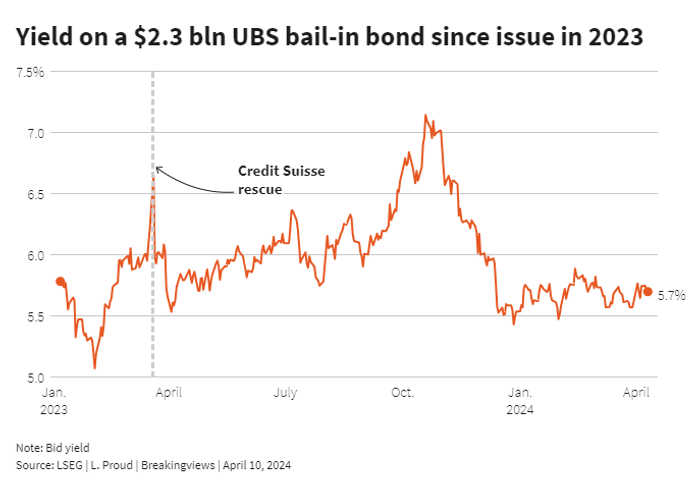Published 19:39 IST, April 11th 2024
Swiss too-big-to-fail rules are too timid to work
The Swiss government on April 10 said UBS and three other systemically important banks will face tougher capital requirements.
- Republic Business
- 3 min read

Bailing out. It’s barely a year since the Swiss government arranged an emergency rescue of Credit Suisse by rival UBS. Swiss Finance Minister Karin Keller-Sutter wants to avoid another debacle. Proposed reforms, unveiled on Wednesday, should make big lenders less prone to a crisis. Yet there’s little progress on the question of whether the enlarged banking behemoth could fail without government support.
The 209-page government document is a comprehensive review of what happened to Credit Suisse in March last year and why post-2008 rules to end taxpayer bailouts did not work. It floats some sensible fixes, like beefing up the powers of financial watchdog FINMA, which currently cannot issue fines.
For UBS boss Sergio Ermotti and his shareholders, the most eye-catching element is a proposal to make the $100 billion group hold more capital. An information sheet accompanying the report, which states that an increase would be “significant”, knocked 3% off the Zurich-based bank’s shares on Wednesday. Keller-Sutter proposed a new “forward-looking” supplement to the common equity Tier 1 ratio, based on supervisory discretion and regular stress tests.
Swiss regulators may also close some loopholes in capital rules that flattered Credit Suisse’s ostensibly healthy ratios. One idea is that banks deduct from their capital the full value of assets which would be worthless in a liquidation, like proprietary software and deferred tax claims. Another requires UBS to fully fund stakes in foreign subsidiaries with an equivalent amount of equity at the parent. A mismatch in this area made it harder for Credit Suisse to wind down or sell its accident-prone investment bank.
These changes make it less likely that UBS will get into trouble. But they do not resolve the question of what happens if it does. Swiss authorities last year wrote off Credit Suisse securities worth $17 billion to smooth the UBS rescue. However, they stopped short of using their post-2008 toolkit for winding down failing lenders.
The report offers some convincing reasons. The next step in a full-on resolution would have been bailing in Credit Suisse’s $60 billion of loss-absorbing bonds. But that might have caused debt investors to offload similar securities, destabilising other banks. Second, it’s far from clear the move would have calmed Credit Suisse customers.
This is not a hypothetical question for Keller-Sutter and her successors: Swiss authorities have twice come to the rescue of the country’s biggest lenders in the past 15 years. If things go wrong with UBS in future, there will be no domestic white knight, while the bill for taxpayers from any bailout will be even larger.
Yet investors appear to see few dangers. Ermotti’s bank has about $107 billion of unsecured debt that’s designed to absorb losses in a crisis. One of the bigger bonds trades with a relatively modest 5.7% yield – roughly the same as when it was issued in early 2023. In Switzerland, the too-big-to-fail problem seems to be alive and well.

Context News
The Swiss government on April 10 said UBS and three other systemically important banks will face tougher capital requirements to shield the country's wider economy from any future failures. In a report, prompted by the collapse of Credit Suisse in March 2023, the government pitched 22 measures for direct implementation. It stopped short of saying how far stricter capital requirements should go. The increase in requirements for UBS will be "substantial, especially if UBS were to retain its current size and structure, or even grow," it noted in an explanatory document. UBS shares were down 2.6% at 27.11 Swiss francs as of 1448 GMT on April 10.
Updated 19:39 IST, April 11th 2024